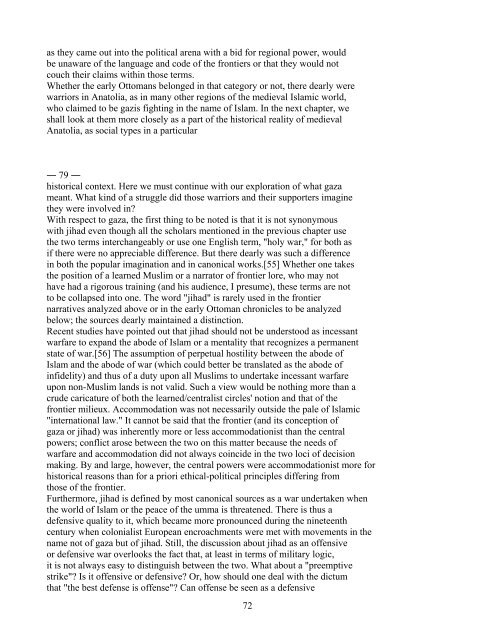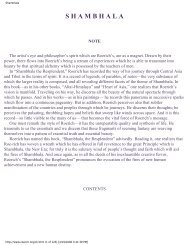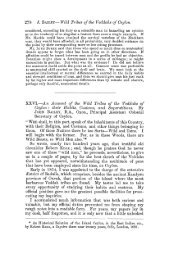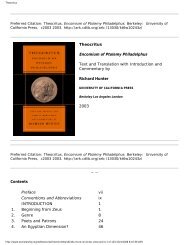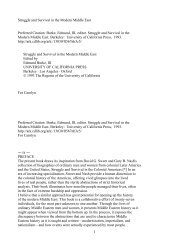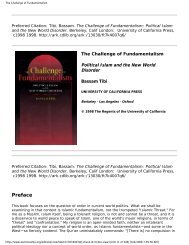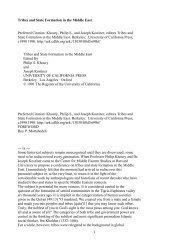Between Two Worlds Kafadar.pdf
Between Two Worlds Kafadar.pdf
Between Two Worlds Kafadar.pdf
Create successful ePaper yourself
Turn your PDF publications into a flip-book with our unique Google optimized e-Paper software.
as they came out into the political arena with a bid for regional power, would<br />
be unaware of the language and code of the frontiers or that they would not<br />
couch their claims within those terms.<br />
Whether the early Ottomans belonged in that category or not, there dearly were<br />
warriors in Anatolia, as in many other regions of the medieval Islamic world,<br />
who claimed to be gazis fighting in the name of Islam. In the next chapter, we<br />
shall look at them more closely as a part of the historical reality of medieval<br />
Anatolia, as social types in a particular<br />
― 79 ―<br />
historical context. Here we must continue with our exploration of what gaza<br />
meant. What kind of a struggle did those warriors and their supporters imagine<br />
they were involved in?<br />
With respect to gaza, the first thing to be noted is that it is not synonymous<br />
with jihad even though all the scholars mentioned in the previous chapter use<br />
the two terms interchangeably or use one English term, "holy war," for both as<br />
if there were no appreciable difference. But there dearly was such a difference<br />
in both the popular imagination and in canonical works.[55] Whether one takes<br />
the position of a learned Muslim or a narrator of frontier lore, who may not<br />
have had a rigorous training (and his audience, I presume), these terms are not<br />
to be collapsed into one. The word "jihad" is rarely used in the frontier<br />
narratives analyzed above or in the early Ottoman chronicles to be analyzed<br />
below; the sources dearly maintained a distinction.<br />
Recent studies have pointed out that jihad should not be understood as incessant<br />
warfare to expand the abode of Islam or a mentality that recognizes a permanent<br />
state of war.[56] The assumption of perpetual hostility between the abode of<br />
Islam and the abode of war (which could better be translated as the abode of<br />
infidelity) and thus of a duty upon all Muslims to undertake incessant warfare<br />
upon non-Muslim lands is not valid. Such a view would be nothing more than a<br />
crude caricature of both the learned/centralist circles' notion and that of the<br />
frontier milieux. Accommodation was not necessarily outside the pale of Islamic<br />
"international law." It cannot be said that the frontier (and its conception of<br />
gaza or jihad) was inherently more or less accommodationist than the central<br />
powers; conflict arose between the two on this matter because the needs of<br />
warfare and accommodation did not always coincide in the two loci of decision<br />
making. By and large, however, the central powers were accommodationist more for<br />
historical reasons than for a priori ethical-political principles differing from<br />
those of the frontier.<br />
Furthermore, jihad is defined by most canonical sources as a war undertaken when<br />
the world of Islam or the peace of the umma is threatened. There is thus a<br />
defensive quality to it, which became more pronounced during the nineteenth<br />
century when colonialist European encroachments were met with movements in the<br />
name not of gaza but of jihad. Still, the discussion about jihad as an offensive<br />
or defensive war overlooks the fact that, at least in terms of military logic,<br />
it is not always easy to distinguish between the two. What about a "preemptive<br />
strike"? Is it offensive or defensive? Or, how should one deal with the dictum<br />
that "the best defense is offense"? Can offense be seen as a defensive<br />
72


